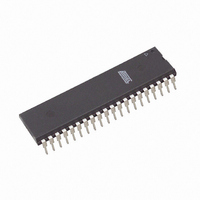ATMEGA16-16PU Atmel, ATMEGA16-16PU Datasheet - Page 252

ATMEGA16-16PU
Manufacturer Part Number
ATMEGA16-16PU
Description
IC AVR MCU 16K 16MHZ 5V 40DIP
Manufacturer
Atmel
Series
AVR® ATmegar
Datasheets
1.ATMEGA16L-8MI.pdf
(26 pages)
2.ATMEGA16L-8MI.pdf
(357 pages)
3.ATMEGA16-16PU.pdf
(358 pages)
4.ATMEGA16-16PU.pdf
(351 pages)
Specifications of ATMEGA16-16PU
Core Processor
AVR
Core Size
8-Bit
Speed
16MHz
Connectivity
I²C, SPI, UART/USART
Peripherals
Brown-out Detect/Reset, POR, PWM, WDT
Number Of I /o
32
Program Memory Size
16KB (8K x 16)
Program Memory Type
FLASH
Eeprom Size
512 x 8
Ram Size
1K x 8
Voltage - Supply (vcc/vdd)
4.5 V ~ 5.5 V
Data Converters
A/D 8x10b
Oscillator Type
Internal
Operating Temperature
-40°C ~ 85°C
Package / Case
40-DIP (0.600", 15.24mm)
Package
40PDIP
Device Core
AVR
Family Name
ATmega
Maximum Speed
16 MHz
Operating Supply Voltage
5 V
Data Bus Width
8 Bit
Number Of Programmable I/os
32
Interface Type
TWI/SPI/USART
On-chip Adc
8-chx10-bit
Number Of Timers
3
Processor Series
ATMEGA16x
Core
AVR8
Data Ram Size
1 KB
Maximum Clock Frequency
16 MHz
Maximum Operating Temperature
+ 85 C
Mounting Style
Through Hole
3rd Party Development Tools
EWAVR, EWAVR-BL
Development Tools By Supplier
ATAVRDRAGON, ATSTK500, ATSTK600, ATAVRISP2, ATAVRONEKIT
Minimum Operating Temperature
- 40 C
A/d Inputs
8-Channel, 10-Bit
Cpu Speed
16 MIPS
Eeprom Memory
512 Bytes
Input Output
32
Interface
JTAG/SPI/UART
Memory Type
Flash
Number Of Bits
8
Package Type
44-pin PDIP
Programmable Memory
16K Bytes
Timers
2-8-bit, 1-16-bit
Voltage, Range
4.5-5.5 V
Controller Family/series
AVR MEGA
No. Of I/o's
32
Eeprom Memory Size
512Byte
Ram Memory Size
1KB
Rohs Compliant
Yes
For Use With
ATSTK600-TQFP44 - STK600 SOCKET/ADAPTER 44-TQFPATSTK600-DIP40 - STK600 SOCKET/ADAPTER 40-PDIP770-1007 - ISP 4PORT ATMEL AVR MCU SPI/JTAGATAVRISP2 - PROGRAMMER AVR IN SYSTEMATJTAGICE2 - AVR ON-CHIP D-BUG SYSTEMATSTK500 - PROGRAMMER AVR STARTER KIT
Lead Free Status / RoHS Status
Lead free / RoHS Compliant
Available stocks
Company
Part Number
Manufacturer
Quantity
Price
Company:
Part Number:
ATMEGA16-16PU
Manufacturer:
Atmel
Quantity:
140
- ATMEGA16L-8MI PDF datasheet
- ATMEGA16L-8MI PDF datasheet #2
- ATMEGA16-16PU PDF datasheet #3
- ATMEGA16-16PU PDF datasheet #4
- Current page: 252 of 351
- Download datasheet (3Mb)
Self-Programming the
Flash
252
ATmega16(L)
Figure 126. Addressing the Flash during SPM
Notes:
The program memory is updated in a page by page fashion. Before programming a
page with the data stored in the temporary page buffer, the page must be erased. The
temporary page buffer is filled one word at a time using SPM and the buffer can be filled
either before the page erase command or between a page erase and a page write
operation:
Alternative 1, fill the buffer before a Page Erase
•
•
•
Alternative 2, fill the buffer after Page Erase
•
•
•
If only a part of the page needs to be changed, the rest of the page must be stored (for
example in the temporary page buffer) before the erase, and then be rewritten. When
using alternative 1, the Boot Loader provides an effective Read-Modify-Write feature
which allows the user software to first read the page, do the necessary changes, and
then write back the modified data. If alternative 2 is used, it is not possible to read the
old data while loading since the page is already erased. The temporary page buffer can
be accessed in a random sequence. It is essential that the page address used in both
the page erase and page write operation is addressing the same page. See “Simple
Assembly Code Example for a Boot Loader” on page 256 for an assembly code
example.
Z - REGISTER
Fill temporary page buffer
Perform a Page Erase
Perform a Page Write
Perform a Page Erase
Fill temporary page buffer
Perform a Page Write
PROGRAM MEMORY
BIT
1. The different variables used in Figure 126 are listed in Table 102 on page 258.
2. PCPAGE and PCWORD are listed in Table 107 on page 262.
PROGRAM
COUNTER
15
PAGE
PAGE ADDRESS
WITHIN THE FLASH
ZPCMSB
PCMSB
PCPAGE
ZPAGEMSB
PAGEMSB
PCWORD
WORD ADDRESS
WITHIN A PAGE
(1)
1
0
0
INSTRUCTION WORD
PAGE
PCWORD[PAGEMSB:0]:
00
01
02
PAGEEND
2466J–AVR–10/04
Related parts for ATMEGA16-16PU
Image
Part Number
Description
Manufacturer
Datasheet
Request
R

Part Number:
Description:
Manufacturer:
Atmel Corporation
Datasheet:

Part Number:
Description:
IC AVR MCU 16K 16MHZ 5V 44TQFP
Manufacturer:
Atmel
Datasheet:

Part Number:
Description:
IC AVR MCU 16K 16MHZ 5V 44-QFN
Manufacturer:
Atmel
Datasheet:

Part Number:
Description:
MCU AVR 16K FLASH 16MHZ 44-QFN
Manufacturer:
Atmel
Datasheet:

Part Number:
Description:
IC AVR MCU 16K 16MHZ COM 40-DIP
Manufacturer:
Atmel
Datasheet:

Part Number:
Description:
IC AVR MCU 16K 16MHZ COM 44-QFN
Manufacturer:
Atmel
Datasheet:

Part Number:
Description:
IC AVR MCU 16K 16MHZ IND 40-DIP
Manufacturer:
Atmel
Datasheet:

Part Number:
Description:
IC AVR MCU 16K 16MHZ IND 44-QFN
Manufacturer:
Atmel
Datasheet:

Part Number:
Description:
IC AVR MCU 16K 16MHZ IND 44-TQFP
Manufacturer:
Atmel
Datasheet:

Part Number:
Description:
IC MCU 8BIT 16KB FLASH 44TQFP
Manufacturer:
Atmel
Datasheet:

Part Number:
Description:
MCU AVR 16K FLASH 16MHZ 44-TQFP
Manufacturer:
Atmel
Datasheet:

Part Number:
Description:
IC AVR MCU 16K 16MHZ COM 44-TQFP
Manufacturer:
Atmel
Datasheet:

Part Number:
Description:
IC MCU AVR 16K 5V 16MHZ 44-TQFP
Manufacturer:
Atmel
Datasheet:











